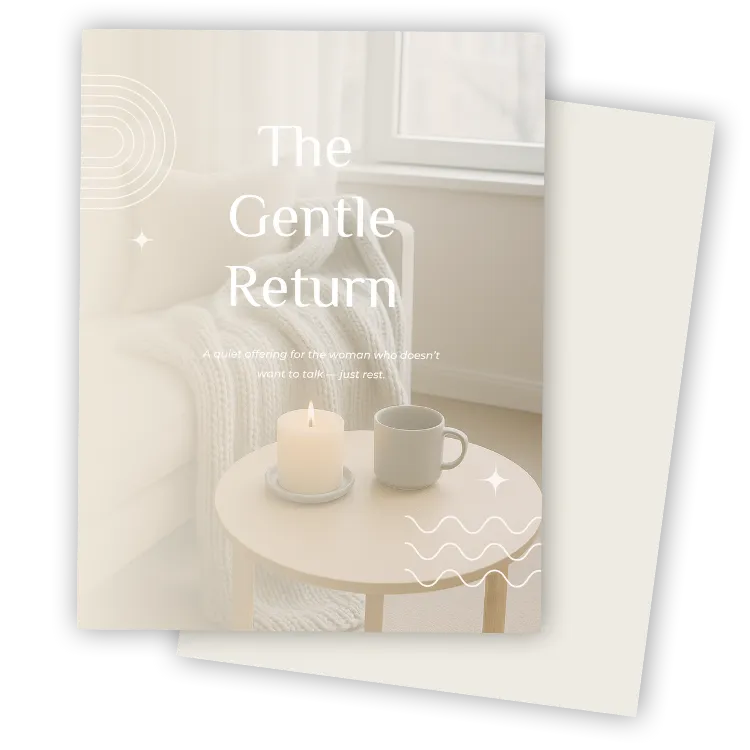
Supporting women who are grieving and don’t want to talk about their pain
At Elaria & Co, we understand that grief is not something you move on from — it’s something you learn to live alongside. Here, you’ll find a sanctuary for your heart: soft hypnotherapy-inspired audios for grief, created to hold you when words feel too heavy.
You don’t need to talk about your loss to be supported.
You only need a quiet moment, a soft place, and a little space to breathe.
You don’t have to explain your grief to be supported.
Here, you can simply rest and begin to heal — quietly, and in your own time.
I went from feeling completely overwhelmed and crying every day, to being able to breath and walk alongside my grief!
rachel
Hi, I'm Kelly!
I created Elaria & Co while walking through my own seasons of grief. I know the ache of holding it all in, the exhaustion of trying to explain what words could never capture.
This space is my love letter to you — a reminder that you don’t have to carry this alone, and you don’t have to speak your pain to be supported.

Grief changes everything. And yet the world often expects us to carry on as if nothing has happened.

Your FREE Support Offering
A Soft Way To Be With What Hurts.
This 5-day gentle offering invites you to slow down, feel without fear, and rest inside your grief — without needing to explain a thing.
These small, daily moments offer relief from the exhaustion of holding it all together.
Ready to take one gentle step at a time?

Join The Quiet Room
The heart of Elaria & Co is The Quiet Room: A soft Audio Lounge filled with calming soft hypnotherapy-inspired audios and gentle practices. It’s a place to rest when everything around you feels too loud. This is not a course or therapy.
But a quiet sanctuary, created just for you.
Follow Me On Facebook
Insights, behind-the-scenes and support when everything around you feels to loud.

Feel like a quiet read?
Ready to build the life of your dreams?

Let's chat
Ready to work with a coach to uplevel your life and business?
Listen to the
Podcast
view my
services
read the
BLOG
Let's chat
Ready to work with a coach to uplevel your life and business?


Let's learn
Learn at your own pace and make quantum leaps.
Student Love Notes
We've helped so many incredible students to find success as Virtual Assistants...

The VA Business Blueprint helped me to go from feeling completely stuck to starting my business and getting my first client!
Ellen, business name

I enrolled in the VA Services Academy feeling completely lost - within 2 weeks I knew exactly what to offer & what to charge.
Ellen, business name

Beginner to Booked Out was a game-changer for me. Anna and her team are incredible and I'm booked out for the next 3 months!
Ellen, business name
New on the blog...

When the Glass Becomes a Distraction: Grief, Women, and the Quiet Pull of Alcohol
The quiet reach for comfort
There’s a quiet way grief shows up in our lives, not always in grand gestures or obvious heartbreak, but sometimes in the small, tender moments we barely notice.
Maybe it’s that evening when the house grows still, and the ache feels too heavy to carry alone.
Maybe it’s the way the world seems a little too loud, a little too sharp, and the weight of loss feels like a stone in your chest.
Many of us have found ourselves reaching quietly for a glass of something, a soft escape from the ache. Not because we want to forget, but because sometimes, the pain is just too much to sit with.
Maybe you’ve noticed it too, how one glass can become two, how the quiet comfort of that ritual offers a brief pause in the endless echo of grief.
I want you to know - this is more common than you might think. And there’s no shame here.
Why grief sometimes leads us to reach for the glass
When loss lands in our lives, it doesn’t just stay in our minds, it lives in our bodies.
Many of us have felt it, that tightness in the chest, the restless nights, the way our breath can get short without warning.
I’ve heard women say, “I didn’t realise my body was holding so much grief until I felt completely exhausted all the time.”
And here’s something gentle to hold onto - your body isn’t broken. It’s overwhelmed. It’s crying out for safety.
You see, grief can put our nervous system into overdrive. It’s like our body’s alarm system has been stuck on high alert, trying to protect us from feeling the full weight of loss all at once.
So, when we reach for alcohol, it’s not just about the drink itself. It’s about what the drink promises: a moment of calm, a softening of the ache, a brief rest from the storm inside.
But that calm is often temporary. Once the effects fade, the nervous system is left rattling, sometimes even louder than before.
And yet, many of us keep reaching for the glass, because what else is there when the ache feels unbearable?
The unseen weight of grief no one talks about
Grief isn’t always loud. It isn’t always about sobbing uncontrollably. Sometimes, it’s the quiet heaviness that settles deep inside, the tiredness that clings to your bones, the fog that blurs the edges of your days.
Many women describe it as feeling “disconnected”, as if life is happening around them, but they’re watching from the sidelines. The loss has taken so much energy that even the smallest tasks feel overwhelming. You might find yourself withdrawing from friends or avoiding invitations because the thought of talking about “normal” things feels impossible.
And yet, in those moments, that little ritual - reaching for a drink - can seem like a lifeline. It offers a temporary sense of grounding, a way to soften the edges of the day. But it’s a fragile comfort, one that never quite fills the space grief has left behind.
The complicated relationship between grief and alcohol
This isn’t about judgment or blame. It’s about understanding a complicated dance between our emotions, our bodies, and the ways we seek relief.
Alcohol can feel like a friend when the nights are too quiet or the thoughts too loud. It can offer a momentary reprieve from the loneliness, the sadness, or the numbness that grief can bring. But beneath that temporary calm, it often stirs up more turmoil - disrupting sleep, intensifying anxiety, or leaving us feeling more alone once the effects wear off.
What many don’t realize is that this cycle can be the nervous system’s way of trying to find balance, a desperate attempt to quiet the alarm bells that grief has set off. Our bodies are incredibly wise, even if the ways they ask for help don’t always feel gentle or healthy.
Listening to the body’s whispers
One of the most powerful moments in healing is learning to listen - not just with the mind, but with the body.
The body holds stories the mind cannot always reach. It remembers love, pain, loss, and longing in ways we often overlook. When grief arrives, it sends signals through fatigue, tension, restlessness, or even physical aches.
When we reach for alcohol, it’s often because our bodies are whispering for comfort in the only way they know.
I’ve heard women say, “I didn’t know how exhausted I was until I finally stopped to breathe.” That pause, that space to truly listen, is where healing begins.
Finding softer ways to hold the ache
Many of us, when we finally pause and listen to what our bodies truly need, begin to realise that the glass, while offering a fleeting calm, isn’t the whole story.
It’s a distraction, yes, but also a signpost.
A quiet way our body asks for something more, something safer, softer, and more nurturing.
For some, this is the moment when we discover the power of gentleness.
I remember hearing from women who shared that the hardest part of grief wasn’t just the loss itself, but the exhaustion of trying to hold it all inside. The nights when sleep slipped away, and the heart felt too heavy for words.
This was when many began to seek out hypnotherapy-inspired audio, a soft, wordless invitation to the nervous system to rest, to soften, to remember what calm feels like.
There’s something deeply soothing about being guided through stillness without having to explain, relive, or fix the pain.
And slowly, that gentle care starts to shift the nervous system out of fight-or-flight, creating space for real rest.
How hypnotherapy-inspired audio gently supports healing
Imagine a space inside you - quiet, safe, and tender - where you don’t have to speak or make sense of your feelings.
That’s what hypnotherapy-inspired audio offers.
It’s not about erasing grief or rushing healing.
It’s about holding your nervous system with compassion, guiding it gently back to safety.
Many women describe it as a kind of “soft hug” for the body - a way to rest without pressure or expectation.
It works through calm voices, soothing rhythms, and carefully chosen words that reach beyond the mind to the heart and body.
When the nervous system feels safe enough to relax, the urge to reach for numbing substances often begins to fade naturally - replaced by a new kind of comfort that doesn’t come with a hangover or regret.
Stories of soft healing: voices of women who’ve walked this path
I want to share some whispers I’ve heard from women who found new ways to hold their grief:
“I used to think I had to be strong and keep everything bottled up. But when I started listening to guided hypnotherapy audios, it was like my body finally had permission to rest. The glass lost its grip on me.”
“At first, I was skeptical. But those gentle audios became my nightly ritual, a soft place to land when words failed me. It didn’t take away the pain, but it made it softer, more bearable.”
“It felt like a friend sitting beside me, reminding me I wasn’t alone even in the silence.”
These stories remind us that healing is not about perfection or quick fixes. It’s about showing up for ourselves with compassion, again and again.
How to start gently shifting your relationship with grief and comfort
If you notice the pull toward alcohol in your grieving moments, here are some gentle ideas to begin shifting that relationship:
Create a soft bedtime ritual. Replace one glass with a calming hypnotherapy-inspired audio or gentle meditation to soothe your nervous system before sleep.
Move your body with kindness. Even a slow, mindful walk outside can signal safety to your nervous system.
Practice self-compassion. Speak kindly to yourself, acknowledging the courage it takes to grieve and heal.
Remember, these are steps - not leaps. Each small gesture builds a foundation for deeper healing.
You’re not alone on this journey
If you’ve ever felt the pull of the glass as a way to quiet your grief, know that you are not alone.
Many women carry this quiet story, often in silence, because it’s hard to share the messy, complicated ways we try to survive loss.
But the path to healing doesn’t require you to carry it alone.
The Quiet Room was created as a safe, nurturing sanctuary for women who want support that feels soft, gentle, and deeply compassionate, especially for those who don’t want to talk about their feelings or relive their pain.
It’s a place to find stillness, calm, and a gentle invitation to begin healing on your own terms.
A soft next step
If this story has touched something inside you, or if you’ve quietly longed for a way to soften the ache without words or pressure, I invite you to explore The Quiet Room.
It’s more than just audio, it’s a companion for your heart when the world feels too loud, and the grief feels too heavy.
✨ Explore The Quiet Room here
Because healing isn’t about forgetting the love or pain.
It’s about learning to hold it, softly, kindly, and with enough room to breathe.
Gentle Closing Reflection
Grief doesn’t follow a straight path, nor does it ask for permission before it arrives.
It shows up quietly in the spaces between breaths, in the silences of the night, and sometimes, in the ways we seek comfort - even if that comfort isn’t always kind to us.
If you’ve found yourself reaching for the glass, know this: it’s a sign of your immense strength and your deep yearning for peace.
Healing begins not by forcing yourself to let go, but by softening the hold, by creating space to feel, rest, and gently come home to yourself again.
You don’t have to navigate this journey alone.
There is grace in seeking softness, in embracing stillness, and in allowing healing to unfold at its own pace.
May you find moments of calm, gentle kindness, and quiet restoration on your path forward.





